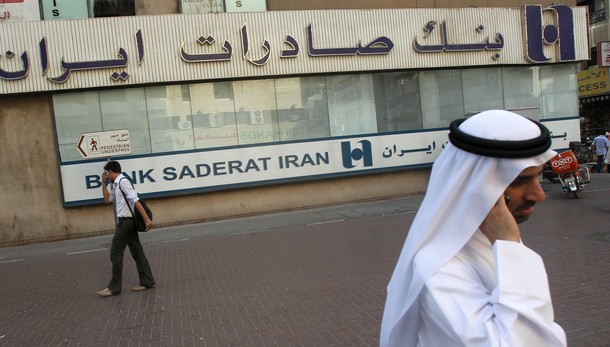
The U.S. Treasury Department recently announced targeted financial sanctions on a long list of Iranian companies, people, and entities. Some of the designations specifically target Iran’s nuclear and missile programs, while others target its energy sector. Still others target the country’s Islamic Revolutionary Guard Corps (IRGC), a brutal group of regime loyalists who crush democratic dissidents and foment terrorism abroad.
Over the last decade, U.S. sanctions have evolved. Treasury has zeroed in on specific nodes of concern within Iran, seeking to isolate and weaken them without hammering the whole population. These “smart sanctions” are designed to impact Iran-sponsored terrorist groups, as well as the Iranian nuclear program and the financial institutions that enable the regime.
The results have been modest, but impressive. Treasury has named and shamed many people and entities involved in Iran’s nuclear program and terrorist infrastructure. In rare cases, assets have been seized. More often, the designations have forced the Iranians to work outside of the formal banking sector, and have alerted other nations about Iran’s illicit activities on their soil.
The June designations should achieve similar results for several reasons:
Timing: They come on the heels of UN Security Council Resolution 1929, which lacked teeth but established the preconditions for the European Union to announce sanctions of its own, which it did shortly thereafter.
Treasury also appears to have coordinated its designations with Congress, which passed its own energy sanctions bill on June 24, targeting the entire Iranian energy supply chain. These sanctions, signed into law by President Obama last week, will force international companies to choose between working in the U.S. market and working with Iran.
The combination of UN, EU, and U.S. sanctions have already prompted a few energy companies to leave the Iranian market.
Exposing Iran’s Nuclear Program: Treasury designated Javedan Mehr Toos, a procurement broker for the Atomic Energy Organization of Iran (AEOI), and Javad Karimi Sabet, a company that carried out activities on behalf of the AEOI. While the U.S. did not likely capture any funds here, the “name and shame” factor may be significant. Iran now knows that U.S. intelligence is actively unraveling its procurement network.
Remarkably, the Treasury also designated Ahmad Vahidi, Iran’s minister of defense, for his role in the nuclear program. Vahidi has thus become a nuclear outlaw of sorts in the eyes of the United States government.
Squeezing Iran’s Banks: The designation of Post Bank of Iran will likely impede Iran’s illicit financial dealings. Treasury identified the bank as Iran’s key instrument for sidestepping sanctions that have already hamstrung other state banks. The designation announcement revealed that Post Bank was involved in numerous transactions with North Korean arms dealers.
Targeting Iran’s Missiles: Treasury also targeted two key elements in the development of Iran’s ballistic missile capability: the IRGC Air Force and the IRGC Missile Command. It also hit Iran’s Naval Defense Missile Industry Group (the UN imposed its own sanctions on the entity in 2007 for developing cruise missiles). Through these designations, Treasury has warned the IRGC and the Iranian military-industrial complex that the U.S. government views them as equal partners in the nuclear program.
Hitting the IRGC: After designating the IRGC in 2007 for international terrorist activities and aiding Iran’s nuclear program, Treasury just added several derivative designations. Treasury also sanctioned two subsidiaries of Khatam al-Anbiya, an IRGC construction firm that funds the regime and lines loyalists’ pockets. Unfortunately, these are only two of many companies that generate billions of Euros for the IRGC.
By designating IRGC commander Mohammed Ali Jafari, Treasury put face to the organization. The agency will liekly designate other senior IRGC officials in coming months.
Tripping Up Shipping: Treasury designated five front companies of the Islamic Republic of Iran Shipping Lines (IRISL). In 2008, Treasury designated IRISL for doing business on behalf of Iran’s military. It has now banned 27 ships connected to IRISL and provided updated data on 71 IRISL ships that had already been blocked, but had been renamed in an attempt to skirt sanctions. This could hinder Iran’s supply chain, particularly if European countries block these Iranian vessels from docking at their ports. It could even lead to seized cargoes.
Outing Iran’s Energy Firms: Treasury added 22 insurance, petroleum and petrochemicals companies to the Iranian Transactions Regulations list, a slate of entities inside and outside Iran with which American firms cannot do business.
These listings should have a chilling effect on publicly traded multinational companies – many of them European firms – that don’t want to be identified as financial enablers of the Iranian regime. After President Obama signs the congressional sanctions into law, companies will have to choose between working with these Iranian companies and doing business in the U.S.
Transatlantic Ties: Treasury’s designation of Iranian energy companies also demonstrates a high degree of cooperation between the U.S. and the United Kingdom. From Kala Naft London to the Iranian Oil Company, Treasury listed about one dozen UK-based companies. This required cooperation from British intelligence and Her Majesty’s Treasury. Thus, it appears that, despite tensions over the BP oil spill, the transatlantic relationship is still solid when it comes to international security.
It also worth noting that Treasury’s role in sanctioning Iran may grow stronger once the President signs the congressional legislation into law, as it will endow Treasury with new enforcement powers. This is important as Treasury has in recent years shown it is more willing and able to enforce sanctions than the State Department.
However, even with expanded powers, Treasury will not be able to derail the Iranian nuclear program. Still, it can expose Tehran’s nuclear network, impede Iran’s energy supply chain, lay groundwork for future U.S. and international sanctions, and provide Europe with key data to hinder Iran’s drive for nuclear weapons.
Jonathan Schanzer, a former intelligence analyst for the U.S. Department of the Treasury, is vice president for research at the Foundation for Defense of Democracies. Photo credit: Getty Images.
Image: Iran%20bank%20sign.jpg
